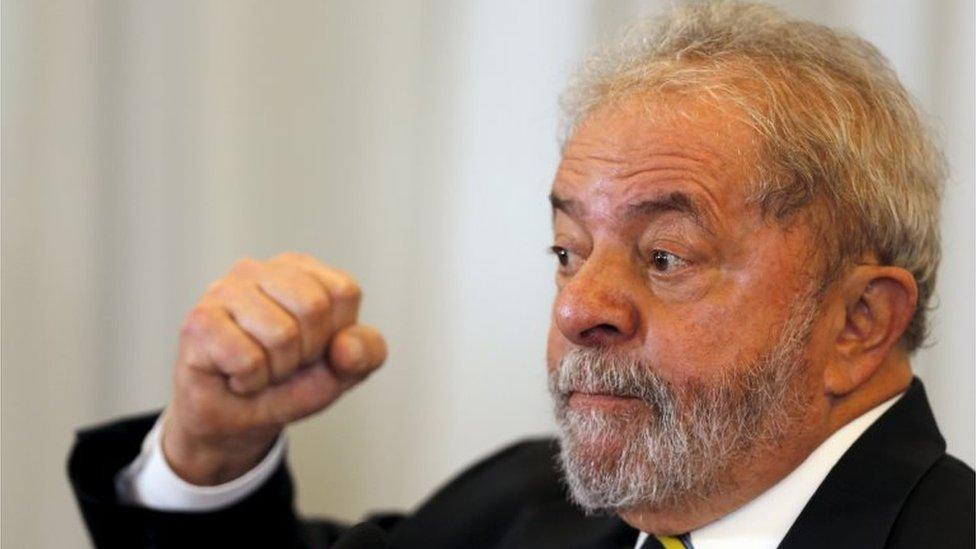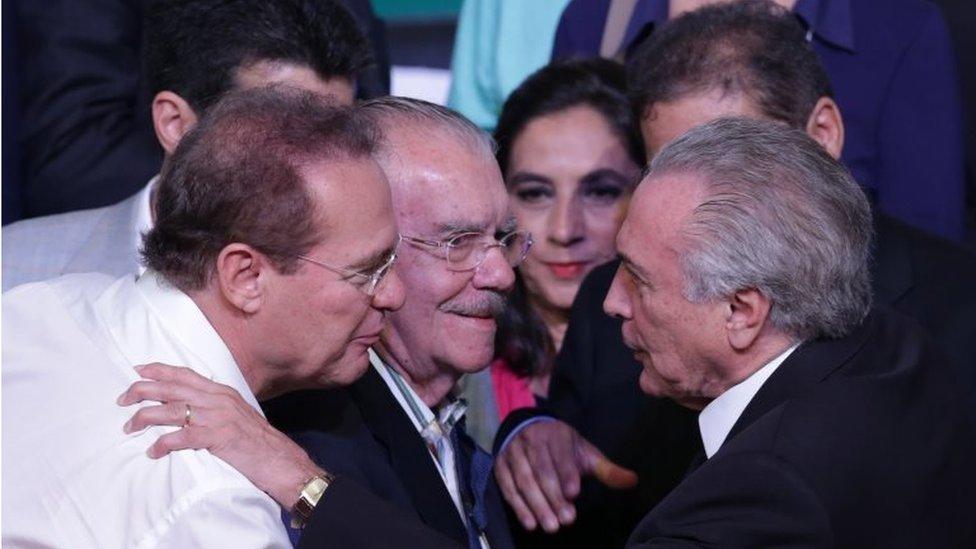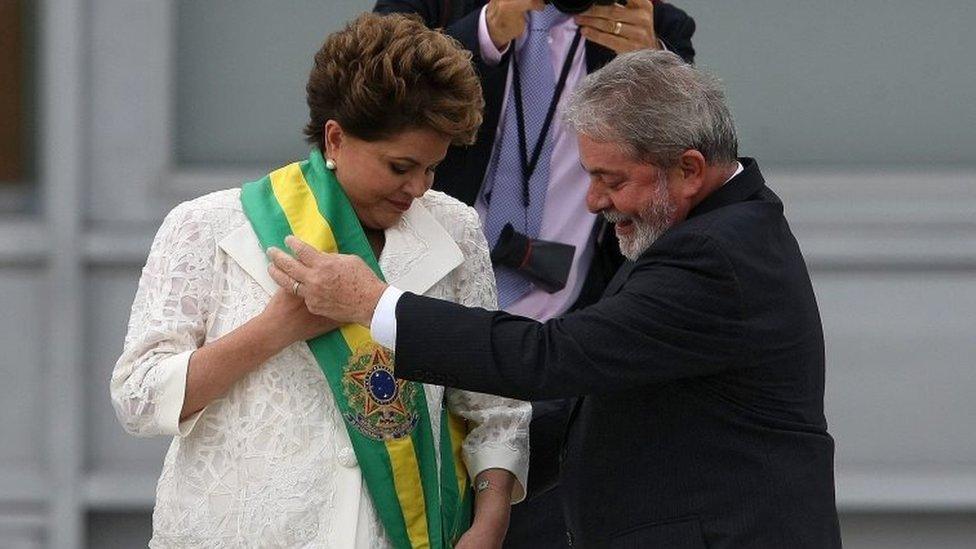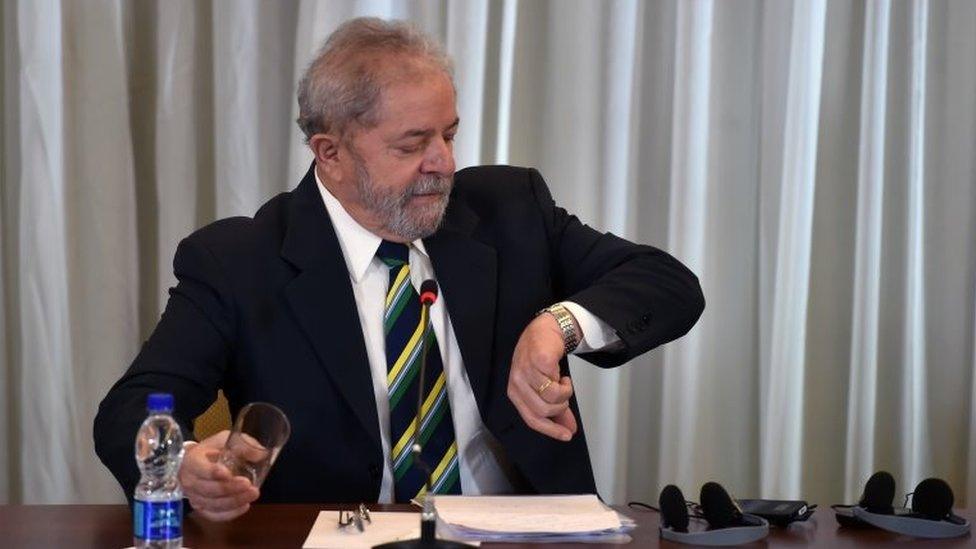Brazil's Lula jumps to President Rousseff's defence
- Published

Ex-leader Lula has come to the defence of his protegee and successor in office, Dilma Rousseff
Brazil's "man of the people" is now pleading with Brazilians to trust a politician many have come to despise.
Brazil's former President Luiz Inacio Lula da Silva has mounted a desperate defence of his hand-picked successor in office, Dilma Rousseff.
Ms Rousseff is fighting moves to impeach her over allegations she manipulated Brazil's account books to hide a growing deficit.
Brazil tumbles like 'House of Cards'
But it may already be too late as her coalition allies are falling away.
'Undemocratic'
The Brazilian Democratic Movement Party (PMDB), the largest in President Rousseff's governing coalition, will decide on Tuesday whether to break from the administration.

PMDB politicians met on Monday to discuss whether to leave the coalition
The party holds seven ministerial posts and the vice presidency, and has 69 members in the 513-member lower house of Congress.
The number of deputies in the lower house is key because it could influence President Rousseff's future.
If Ms Rousseff can get a third of all deputies behind her, she can block impeachment proceedings against her.
But if she loses the support of the PMDB and its members vote in favour of her impeachment, the lower house could suspend her and replace her with Vice-President Michel Temer.
The Senate would then have to decide if she should be removed from office.
Lula told members of the foreign press on Monday that such a move would be "undemocratic" and likened it to a coup attempt.
"Impeachment without a legal basis is a coup, there is no other word," he said.
"They want to shorten President Dilma [Rousseff]'s term through a coup," he added.
The former leader spoke for over two hours in a bid to win over members of the international media.
Lula distrusts the Brazilian press and accuses them of helping to construct a narrative against President Rousseff.
"It's not the headlines of a newspaper that can absolve or convict somebody," he said.
"We are seeing exaggeration and people being convicted even before there was a due legal process."
Fall from grace?
Five years ago, if Lula talked most people would have listened. He left office in January 2011 with an 83% approval rating.

Lula enjoyed high approval ratings when he handed the presidential sash to Ms Rousseff in 2011
A president who rose from abject poverty promising major reforms to the country's political and economic system, he presided over Brazil's longest period of economic growth in three decades.
But now he may be slowly falling from grace.
Prosecutors are investigating the largest corruption scandal in the country's history at the state-controlled oil company Petrobras, with hundreds of millions of dollars in kickbacks.
Earlier this month, he was briefly detained and questioned about allegations he took gifts from construction companies involved in this bribery scandal, which he denies.
In an extraordinary move, President Rousseff tried to appoint Lula as her chief of staff despite the ongoing investigation.
Many believed this was to save him from being arrested as those who hold ministerial posts enjoy a certain level of immunity from prosecution.
Thousands of people took to the streets to protest and his appointment was suspended by the Supreme Court, which is due to pass a final ruling on the matter next week.
The move put Brazil and its politics back in the headlines.
Lula believes the way the high-profile investigation is being conducted could tarnish Brazil's international image.
In particular he took issue with the release to the media of taped conversations and witness statements by the federal judge in charge of the investigation, Sergio Moro.
"Yes we should fight corruption and we should find out who's stolen... but is it necessary to make a TV show out of it?," he asked.
"Is it necessary to turn it into some kind of Big Brother show?," he added before asking: "How much is this affecting the Brazilian economy?"
'Joy'
Charismatic and witty, Lula believes he can bring back "joy" to Brazil.
It is certainly much needed when you look at the country's economic woes.
The International Monetary Fund in January projected that the Brazilian economy would shrink by 3.5%, 2.5 percentage points more than its previous estimate.
Unemployment has continued to climb, rising to more than 8% compared to 5.8% a year earlier.
But Lula may be in no position to fight the economic meltdown facing his country.

Is time up for Lula?
His fate lies in the hands of others.
Prosecutors have charged him with money laundering but a judge has yet to decide whether to accept those charges.
In the meantime, the Supreme Court will debate whether he should be allowed to take up his post as chief of staff or not.
And if President Rousseff is ousted, Lula loses his main backer and there is unlikely to be a position for him in government.
Lula's Workers' Party believes "elitists" in Brazil are conspiring against him.
His controversial appointment has divided Brazilians, with thousands of people taking to the streets of Sao Paulo and Rio in rival demonstrations to protest for and against the former leader.
On Monday, Lula said he all wanted for Brazil was for "everybody to be Brazilian".
"I don't want to split Brazil, I don't want to split the country between the white elite and the poor, be they black or white."
After the most tumultuous few weeks in politics since democracy was returned to Brazil, Lula's wish may be in vain.